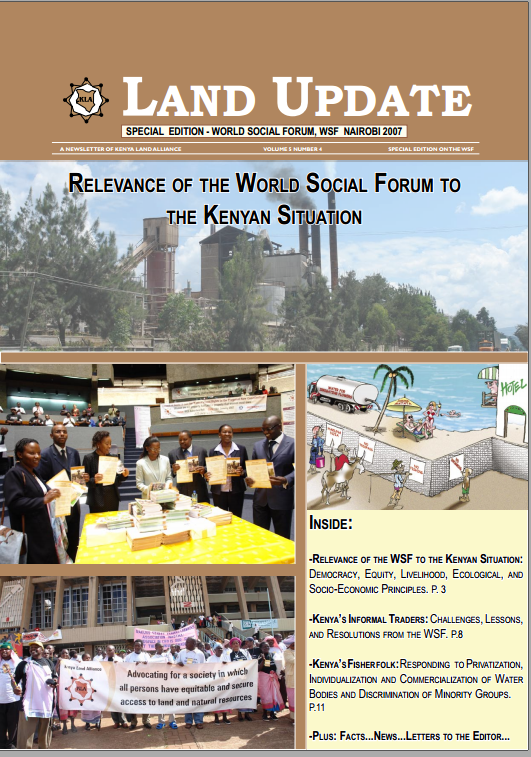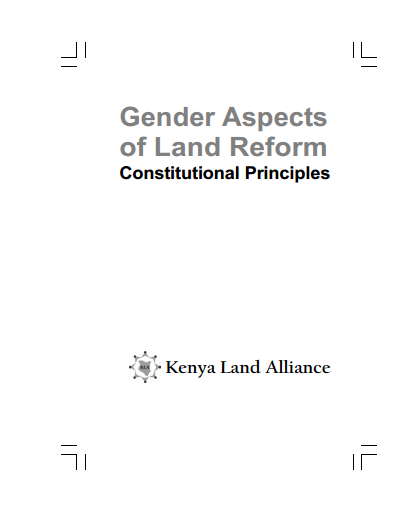Land Mali Umma
For a long time the issue of land and related problems has been debated mostly by academicians, politicians and professionals. Although the problem has remained more or less one of the most talked of in Kenya, the public has very often been left out of the debate. Again mostly the debate has been dominated more by complaining about either the lack of policy or the bad land policies and laws and the failure by successive governments to correct those problems.
Relevance of the World Social Forum to the Kenyan Situation
The World Social Forum in Nairobi in January 2007 was a timely New Year rallying event for Kenyans to revisit the fundamental principles for building a democratic and sustainable society as we prepare for December 2007 elections.The current organizing principles of the institutions that govern us in Kenya are narrow and serve the few at the expense of the many millions of Kenyans that live in abject poverty. Yet, from all corners of the country it is acknowledged that it is within our collective ability to create a healthy and sustainable society that serves and work for all
Gender Aspects of Land Reform Constitutional Principles
Throughout this pocket size booklet, Land Reform Volume 4, KLA proposes that collectively as a nation, and especially during this time of the constitutional review process. The principles outlined be embraced with the purpose of providing women a deliberate opportunity to engage in decision-making as regards land-use,management and ownership.
The Draft National Land Policy: A Step towards Land Reforms
Through this Land Update, KLA appreciates that for the first time in the history of Kenya a comprehensive Draft National Land Policy has been formulated.We therefore urge all Kenyans and the general public to read, debate and contribute to the finalization of the National Land Policy. This is because the final National Land Policy will provide the basis for the review and harmonization of the existing laws and enacting of new ones to facilitate the achievement of the objectives set out in the overall national development policy framework, Kenya Vision 2030
THE LAND SECTOR NON-STATE ACTORS (LSNSA)
kenya land alliance download :Memorandum On Continued Engagement With The Ministry Of Lands On Land Reforms Presented To: The Ministry Of Lands. The approval by the public of the Constitution at the referendum on August 4, 2010 and its promulgation on August 27, 2010 heralded a new dawn of governance in Kenya. Through its broad provisions, it is expected that it will spur social and economic development and secure the land rights of all Kenyans, by among others guaranteeing them ownership, control and access to natural resources.
The National Land Policy in Kenya Critical Public Land Issues and Policy Statements
The National Land Policy in Kenya: Critical Public Land Issues and Policy Statements is a guide to steer the debate and eventual formulation of a National Land Policy and legislative framework that will address issues of management and administration of public land in Kenya.
The Brazilian agrarian issue requires solution in the XXI century
BUDGET ANALYSIS OF PUBLIC ENTITIES MANAGING LAND AND NATURAL RESOURCE FUNCTIONS

Youth access to land, migration and employment opportunities: evidence from sub-Saharan Africa
This paper examines the intersections between youth access to land, migration decisions and employment opportunities using nationally representative and multi-year data from multiple African countries. We document evidence on the evolving dynamics in land distribution and ownership patterns, the effect of land access on youth livelihood choices and development of rental and sales market in the region.
The narrative on rural youth and economic opportunities in Africa: facts, myths and gaps
A narrative on rural youth in Africa has continued to evolve in policy circles around the world. Much of it is driven by population statistics that point to an imminent youth bulge in Africa and concerns about a poor economic outlook (stagnation) for African productivity and growth. Fears of massive unemployment, social unrest and undesirable migration due to limited economic growth drive the bulk of the discourse. This is juxtaposed with the promise of a youth dividend for the continent, which is highlighted by some quarters of the policy debate.
Investing in rural youth in the Near East, North Africa, Europe and Central Asia
Countries of the Near East, North Africa, Europe and Central Asia (NEN) region face a myriad of social, economic and political challenges that have stalled their structural and rural transformation processes. This has had a detrimental impacton rural youth, who, as a result, face limited economic opportunities. The NEN region has the highest youth unemployment rates in the world. Weak education systems are failing to provide youth, especially in rural areas, with the cognitive and non-cognitive skills they need to compete in a global economy.









